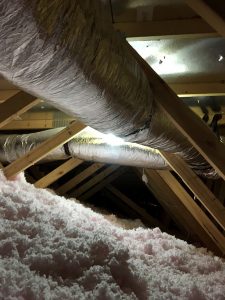 Everyone is getting ready for the coming of summer weather around here, and that means taking care of air conditioning maintenance jobs, both for homes and businesses. Maintaining your air conditioner with the help of our skilled technicians is the best way to ensure an AC that works without fault over the summer and won’t cost more to run than it should.
Everyone is getting ready for the coming of summer weather around here, and that means taking care of air conditioning maintenance jobs, both for homes and businesses. Maintaining your air conditioner with the help of our skilled technicians is the best way to ensure an AC that works without fault over the summer and won’t cost more to run than it should.
But there’s more to keeping your AC energy efficient than seeing it’s properly maintained. One of the big “energy thieves” in homes comes from leaks in the ductwork, and it’s something that people often don’t think about. Proper duct sealing from ventilation professionals can stop your HVAC system from losing from 20% to 30% of the air moving through it. Think about what that means: that’s air you pay to cool in the summer (or heat during the winter) that simply goes to waste. With the ducts sealed up, you’ll see significant savings on your monthly energy bills.
This Is a Professional Job
Unfortunately, the moment we used the words duct sealing, people think of, yes, duct tape. And that’s a problem, because although duct tape is useful for many household jobs like closing boxes and temporarily holding objects in place, one job that it’s not useful for is… sealing actual ducts.
So why is it called “duct tape” in the first place?
It’s a strange story, and not even a certain one. Duct tape, when used to refer to the consumer-grade tape available in stores, is a cloth-backed adhesive that was first developed around the time of the First World War. Its original purpose was to quickly seal up ammo boxes, and it was called duck tape. There are two explanations for this name: it was either because it was backed with duck cloth, or because its water resistant properties reminded people of how water washes off a duck’s oiled back.
It wasn’t until the 1950s that duck became duct because of the mistaken assumption that it might work on ducts as a way to repair and seal them. Superficially, it seems like this would work. But tests have repeatedly shown that it doesn’t. The problem is that duct tape reacts poorly to heat and temperature fluctuations, and this is common in ductwork. The adhesive of duct tape soon turns brittle and the tape fails. In 11 out of 12 cases where duct tape was tested on ductwork, the tape failed within a month.
The Professional Difference
Professional duct sealing uses special equipment, such as resin-based mastic sealant and metallic tapes, to ensure the ductwork is made airtight again. But it takes more than just professional sealing equipment to do the job right. HVAC technicians must locate where the leaks are occurring and access them—and this simply isn’t something an amateur can hope to do.
If you suspect you need duct sealing in Eugene, OR, or in the surrounding areas, call on our technicians. They’ll test to see where you have air leaks in your ductwork and then handle the sealing required to restore your HVAC system to peak condition for the coming summer.
Comfort Flow Heating serves all of Oregon. We’re here with 24-hour emergency service when you need it.

